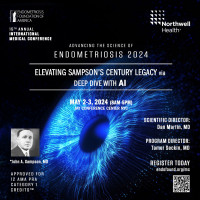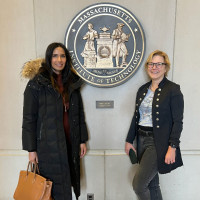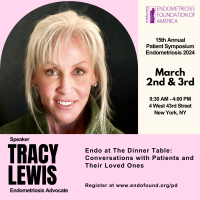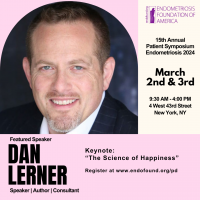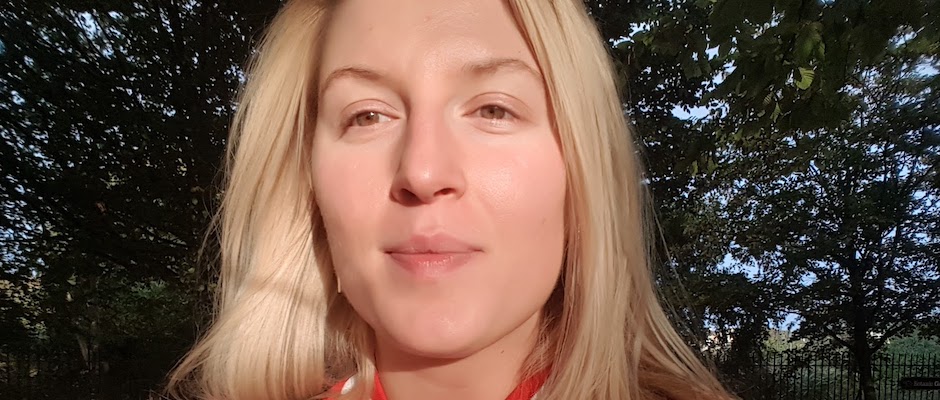
Denial, Struggle, and Hope
My story begins when I skipped school. I remember being comforted by the stillness and the warmth of the water in the bathtub. Any move or slight touch would cause sharp pain. I wanted to escape from my mom and my teachers who used to tell me to “just walk it off,” “everyone has period pain.” I wanted to explain to them, but their look of disbelief was crushing me. It was as if I was speaking in a foreign language and I couldn’t articulate what was wrong with me.
But I found my words and much more over the years in three stages: denial, struggle, and hope.
1. The Denial
When I was first diagnosed, I ran away from facing my disease. This happened after I heard from the best specialist in my hometown, a very “emphatic” doctor. He said I have endometriosis and I should probably lose some weight and get pregnant as soon as possible. That was it. No treatment, no explanations, no answer to my questions, just pity on his face and complete silence. I was terrified. I hid that information deep, in a dusty corner of my mind, and it only resurfaced after symptoms were too hard to ignore.
2. The Struggle
I couldn’t even tie my shoelaces. I could feel what turned out to be a 6cm cyst. My partner would carefully lay down in bed as he knew any sudden movement would cause immense pain on my first period days.
I remember after my first surgery, I experienced a few good years, but the pain came back hitting harder. I knew something was wrong.
I was at work, too embarrassed to talk to my male manager, so I went to what I thought was better: a woman in HR. I finally found some courage to ask to work from home, explaining how difficult managing the pain was. Very abruptly, I was told that all women have period pain and they don’t ask to work from home, afterall, “how’s a company supposed to work if all women took WFH on their period?”
While I was trying to change jobs, I was asked in an interview if I was pregnant. The interviewer was looking at my small endo belly. I froze! I didn't know what to answer because I was in shock. I remember wanting to get up and leave but I just couldn’t do it, I couldn’t react. I mumbled a diplomatic answer and swore to stand up for myself if anything like this happened again.
One day I decided to move in with friends, as I thought they would offer empathy, support, and ask during those hard days, “Are you ok?”, “Do you need a painkiller?” I instead received a lot of lessons and wisdom on how to select future friends.
At work, a multinational company, I was suffering in silence. Although my manager was understanding despite being a man, my team members were not showing the same compassion.
My First Time in the Emergency Room
I was on my way home from an MRI, and in the tube I started sweating and shivering. I felt needles in my pelvic area. I tightened my hands on the bar as I was pulling myself out of the tube station. I sat down on a bench and was in tears. The two women who sat next to me looked at me and continued their conversation. I interrupted them and begged them to get me a cup of hot water, while I held on to my pelvic area, hoping the pain would slow down. I wasn’t thinking straight since I called an Uber afterwards instead of an ambulance. I didn’t know what was coming. I got home, showered to let hot water on my painful area, but I started shivering uncontrollably instead. I was paralized with pain. Reaching for my phone and calling an ambulance felt impossible. I lay down for what felt like an hour until I pushed my limits and reached for the phone and finally called. I could barely articulate any words as I was shivering with pain. I cried and called my boyfriend for help as well. By the time the ambulance came, I had taken 600mg of ibuprofen, and was still in pain but able to walk with a bit of help.
My Second Time in the Emergency Room
One month later, I had just finished a meeting when I felt stabbing pain, similar to the pain a month before. I ran towards my colleague and shouted to call an ambulance. I ended up getting a cab and the 30 minutes to St. Thomas Hospital felt like forever. As I got to reception, waiting for my turn at the ER, I kneeled as the pain was making me unable to stand on my own. The receptionist looked at me and continued to slowly ask the person before me their details but didn't bother to call for assistance. After I shouted for help several times she took time to ask for someone to pick me up. I was given morphine.
I remember thinking, how did I get myself in this situation? For months I was asking for a treatment to stop the progression. Instead, I was given promises and excuses, from both my private and NHS healthcare. On my last visit, in a private consultation, I demanded a clear plan to prevent a relapse from my specialist. But he failed to follow it by not attending on the agreed date. In tears, I tried calling my private endometriosis specialist again and again and again. After trying to contact my unreachable specialist, I decided to write a complaint regarding his lack of support and professionalism. Searching for "write complaint about" gives a very different result than "reviews about". This was how I found out that he had numerous complaints and a lawsuit.
Months later, I was looking for another private specialist, at another clinic. At a very well-regarded clinic, I asked for a pelvic scan consultation. I instead received a conversation. A very shocking conversation. As I was complaining about the stress at work and how I was probably secreting cortisol, the specialist read aloud from her notes: “Secreted cortisol from ovaries”. Uhm….ovaries??? “Do you mean adrenal glands?” I asked. The specialist looked surprised, but didn’t apologize for the anatomy mistake and continued the scripted questionnaire. The discussion was followed by a few other medical mistakes and I decided to leave the consultation room. I explained at reception that I am not willing to pay for poor, unsolicited service as I had asked for a pelvic scan, not a conversation. But I couldn’t even find words to articulate the shock I was in. How many women out there were putting their faith, their life, their health in the hands of this inaccurate doctor?
In my following job role, I was under so much pressure, not only because of the engineering demands, but also because of the chronic inflammation that would give me severe brain fog. In my worst days, I felt I could barely make sense or find my words. I would pray that others would not notice and I blamed chronic fatigue instead of the inflammation. The company pretended to fully support me and my decision to have surgery but silently worked a reason to fire me. I guess they won.
I thought that ending up in the emergency room twice and experiencing two years of waiting for a laparoscopy would guarantee me a spot on the surgery waiting list. But eight months later, my NHS specialist along with his team, told me they are still deciding, even as the doctors in the emergency room assured me they added me to the waiting list.
3. The Hope
Enough was enough. After a lot of research and unbelievable luck, I found a surgeon outside the UK who was willing to operate on me, asap, privately. Surgery went well. I still struggled with pain but I found comfort and encouragement in friends, family, and support groups. I did a fundraising for Endometriosis UK on my birthday and started coding for my own platform to bring support and positivity to all the endometriosis fighters (https://endo-fighter.com).
My dream is to help other endo-fighters out there, to somehow combine the IT world with medicine and bring an end to this pain. I am currently trying to find a more endo-friendly way to work, something that balances my passion to be the best in my field without sacrificing my health.
At work, I was asked once again if I was pregnant. This time I found my words and I gave a burning answer to a burning question.
After three stages, denial, struggle, and hope, I found four things in return: better criterias for friends, strength to stand up for myself, a dream, and a way to work around my endometriosis.
Editor's note: Would you like to contribute to EndoStories? Click here to learn how to submit your work.
*Patient stories submitted to EndoFound.org are the views of the patient and not necessarily those of the foundation. All testimonials are from real patients, and may not reflect the typical patient’s experience, and are not intended to represent or guarantee that anyone will achieve the same or similar results.





